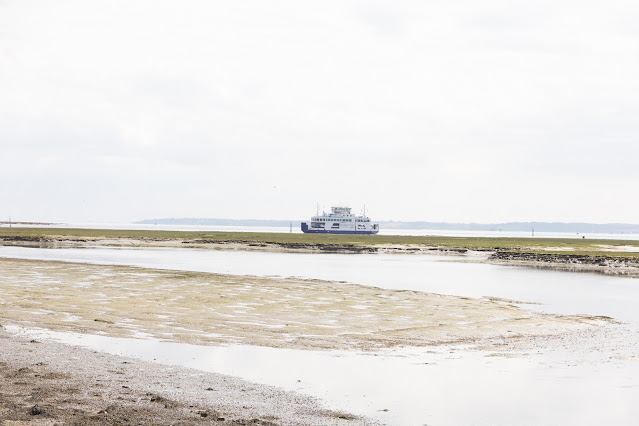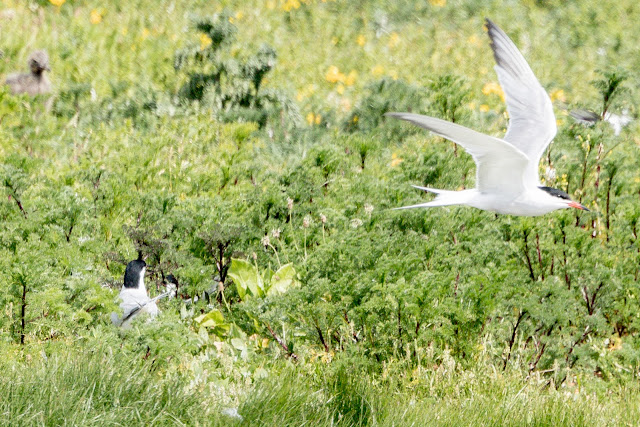I've not done a blog recently, mainly because I've not been out birding that much, or at least not for anything terribly exciting or photogenic. Yesterday though I had the chance to go out and do a full days birding.
I started off on the south coast at Normandy Marsh, one of the series of small lagoons opposite the Isle of Wight. The target was a pair of roseate terns which have been nesting. They do already nest in the Uk, but mainly on the east coast in Northumberland. This nest was first spotted a couple of weeks ago and is in a fairly accessible location. Unusually it was a nice day so after parking up, a short sunny walk got me to the lagoon. This was separated from the channel by a seawall and you had the Isle of Wight ferries passing by you every so often.
The main tern island was pretty busy with common and little terns nesting and flying back from the sea with fish to feed their youngsters.
I quickly learned from the 3 other birders there that the roseate tern nest wasn't viewable and that your only chance was when there was a change-over on the nest. We knew where the nest was so we could at least watch that area. One bloke had been there over an hour already waiting! It was quite tricky as there was a constant flow of birds in and out and you had to assume any one of them could be the returning roseate.
There was lots of activity to keep us amused whilst we waited including this redshank posing on a nearby post.


Fortunately my luck was in and I only had to wait about 10 minutes before we spotted a slightly different bird flying over the island.
Roseates are slightly smaller than common terns but the main points of difference are the bill, which is all or mainly black and the longer tail streamers, more reminiscent of arctic terns. They also have a much more white colouration than the greyer mantle of the common terns. Anyway, it was an easy spot and it came straight down near the nest site.
For a few minutes it groomed itself and plucked away at the vegetation. As they prepared for the changeover you could see a bit of movement in the grass behind it and the second tern was just about visible from the right angle.
You can just about make out the white of a bird and the black cap. They did a change over and the second bird headed straight out over there lagoon to go and fish. The eggs aren't hatched yet and probably have another few days to go.
By now the crowd had grown to about 20 people and the heat-haze was building so I decided to call it and head off for my next stop.
This was in the New Forest, specifically at a car park called Pig Bush. This is a known spot for seeing honey buzzards and I have had them there before. It was only a short drive, lightened by the numbers of New Forest ponies and donkeys by the roadside. I had only gone the short walk from the car park to the open heath area when I saw two birders lurking behind a tree. It wasn't honey buzzards they were watching but a redstart family feeding a chick which was sitting on a pile of horse poo!
The first bird to come down was the smart male bird,
with the female in close attendance, coming down via the nearby gorse bushes.
They seem to be very good parents though I think this large worm was eaten by the male itself rather than its progeny.

I then walked up to the top of the heath to try and see there honey buzzards which live in the woods nearby. Stonechats were omnipresent on the gorse with their sharp call which gives them their name - it's supposed to sound like two stones being hit together.

After about half an hour and seeing two goshawks and a common buzzard I finally go onto a raptor soaring over the forest. It had very flat, long wings, rather than the characteristic V-shape of a common buzzard and the head, even at some distance seemed "right" with a jutting-out appearance. Way too far for photos but I watched it for 10 minutes whilst it soared up and down, possibly even doing a display flight.
With it now getting late I called it a day and headed home. I did have one more stop for day. I went out early evening to Chobham Common. This got me Dartford warbler, nightjar and woodcock for my year lost. The night was really cold and the nightjars in particular seemed very subdued compared to normal. Very few insects on the wing for them. Still, a good day and takes my year list up to 213. This is very much mid-range but a trip to Dorset and Pembrokeshire before the end of the month should get me a bit higher.





















No comments:
Post a Comment